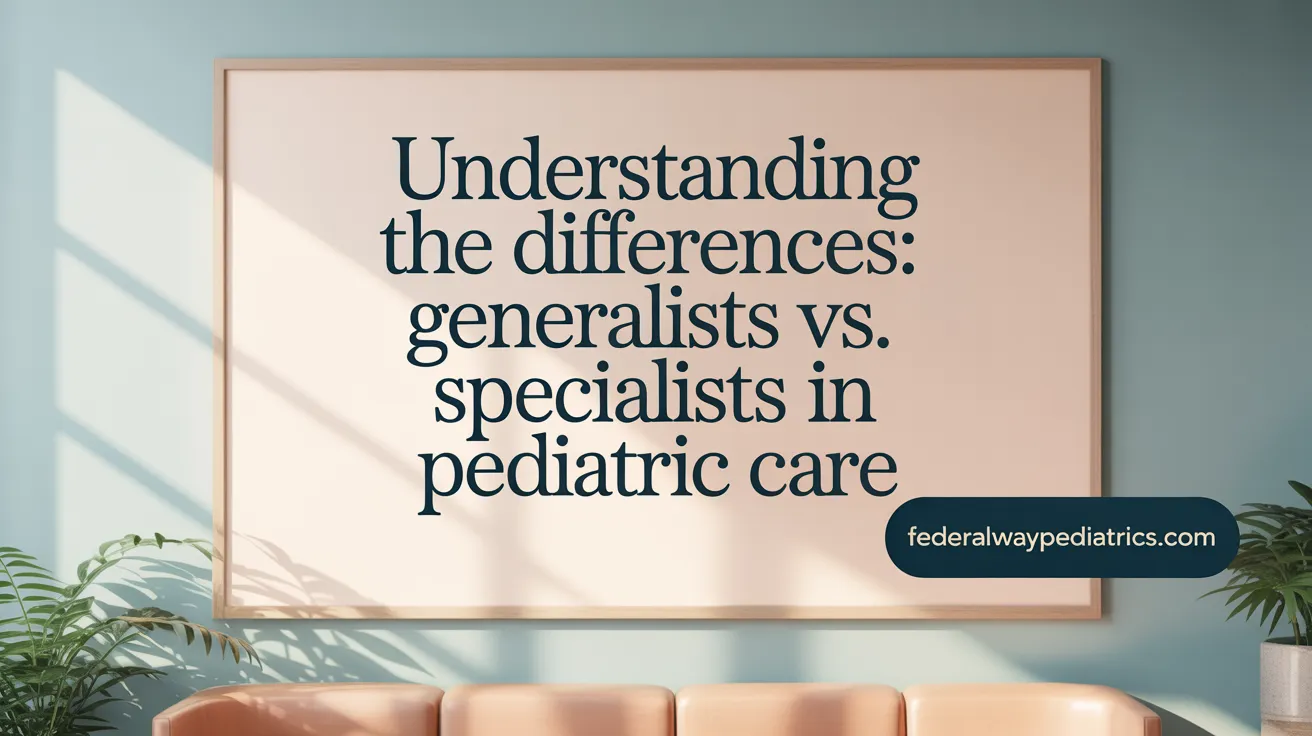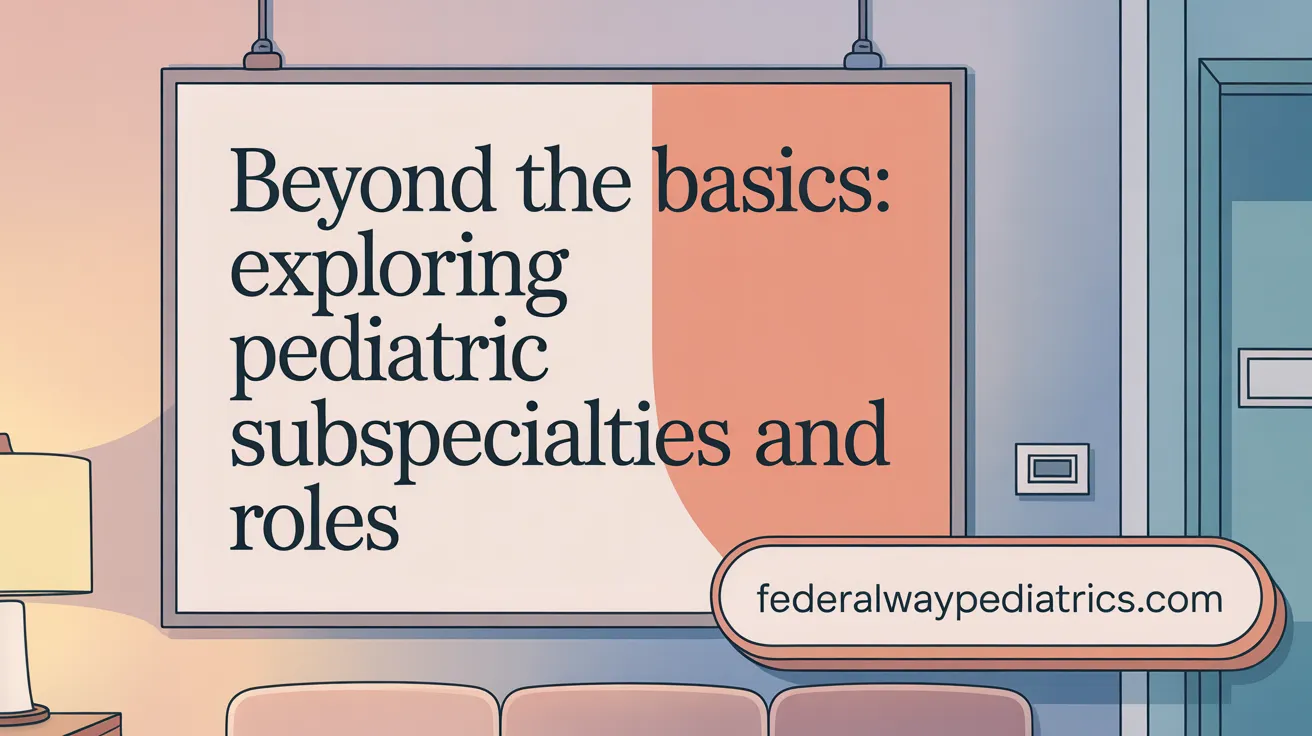Understanding the Pediatric Healthcare Landscape
Choosing the right pediatric healthcare provider is a critical decision for parents and caregivers, impacting a child's health and development through every stage of growth. This article explores the differences between general pediatricians and pediatric specialists, guiding families on when and why to seek each type of care, the roles these providers play, and how to navigate transitions in care as children mature. Understanding this landscape ensures children receive timely, appropriate, and comprehensive care tailored to their unique needs.
Distinguishing General Pediatricians from Pediatric Specialists: Roles, Training, and Scope

What are the differences between general pediatricians and pediatric specialists in terms of their roles, training, and scope of practice?
General pediatricians serve as the primary healthcare providers for children and young adults from birth to age 21. Their main focus is on providing comprehensive preventive care, monitoring growth and development, and managing common childhood illnesses like ear infections, colds, and injuries. They often act as the first point of contact for health concerns and coordinate care with specialists when needed. Learn more about the role of general pediatricians and how they contribute as primary care providers.
These physicians complete a standard three-year residency in pediatrics following medical school, which equips them with broad skills in general pediatric health. They work in various settings, including outpatient clinics, hospitals, and community health centers. Their responsibilities also encompass developmental screenings, vaccination administration, behavioral health assessments, and parental guidance. For details on pediatrician training and responsibilities, see how they manage pediatric health conditions and preventive care.
Pediatric specialists, by contrast, have pursued additional fellowship training in specific subspecialties such as pediatric cardiology, neurology, endocrinology, or oncology. This supplementary training typically lasts three to five years and focuses intensely on organ-specific, chronic, or complex conditions. You can explore types of pediatric subspecialties for an overview of specialties and fellowship training requirements.
Specialists often work within hospitals, academic medical centers, or specialty clinics, managing patients with long-term, complex illnesses that require specialized procedures or treatments. They provide expertise in areas like managing congenital heart defects, seizure disorders, or childhood cancers. Their role and when to see them is explained under pediatric specialist roles and conditions treated.
While general pediatricians focus on the overall health and early intervention, subspecialists delve into detailed, organ-specific care for more complicated cases. Both roles are vital, with primary care pediatricians acting as gatekeepers and coordinators who refer patients to subspecialists when complex issues arise. The distinction and collaboration between these roles are summarized in pediatricians and pediatric subspecialty physicians.
In summary, their main differences lie in the depth of medical training, the scope of conditions they handle, and the healthcare settings in which they practice, reflecting a tiered approach to pediatric healthcare aimed at covering both broad wellness and specialized needs. For comprehensive insights, see what is a pediatrician vs. a pediatric subspecialist.
When to Choose a General Pediatrician Versus Consulting a Pediatric Specialist

Criteria for seeing a general pediatrician
Parents should primarily turn to a general pediatrician for routine healthcare needs, preventive check-ups, immunizations, and treatment of common childhood illnesses such as ear infections, colds, or minor injuries. General pediatricians are trained to monitor overall growth and development, identify early signs of health issues, and guide parents through various stages of a child's physical and emotional growth.
Situations warranting referral to pediatric specialists
When a child's health concerns involve complex, chronic, or unusual conditions, specialist care becomes essential. Examples include congenital heart problems, neurological disorders such as seizures, endocrine issues like diabetes or thyroid conditions, genetic syndromes, or significant mental health challenges like autism or severe behavioral issues. Children with multi-system involvement or needing advanced procedures and intervention are also referred to specific pediatric specialists.
Role of the primary pediatrician in care coordination
The adult pediatrician acts as the primary coordinator of a child's healthcare, establishing ongoing relationships and overseeing their overall health. They evaluate whether symptoms or conditions require specialist attention and facilitate timely referrals. The pediatrician remains involved to ensure integrated care, follow-up, and continual management, especially when a child's condition involves multiple care providers (Pediatric Primary Health Care: The Central Role of the Pediatrician).
Examples of conditions managed by specialists
Some common pediatric subspecialties include:
| Subspecialty | Conditions Managed | Additional Notes |
|---|---|---|
| Pediatric Cardiology | Congenital heart defects, arrhythmias | Requires advanced diagnostics and interventions |
| Pediatric Neurology | Seizures, cerebral palsy, developmental delays | Involves specialized testing and therapy |
| Pediatric Endocrinology | Diabetes, hormone disorders | Focus on long-term metabolic health |
| Pediatric Gastroenterology | Chronic digestive issues, food allergies | Often involves endoscopic procedures |
| Pediatric Oncology | Cancer treatment | For children with tumors or blood disorders |
This structure ensures children receive care suited to their specific needs while maintaining continuous oversight by their primary pediatrician.
Exploring Pediatric Subspecialties and Healthcare Roles Beyond the Generalist

What are the roles and responsibilities of different pediatric healthcare providers, including pediatricians, subspecialists, and hospitalists?
Pediatric healthcare provision involves a variety of professionals working together to ensure children's health and development. General pediatricians serve as the primary care foundation, focusing on preventive services, routine check-ups, and managing common illnesses. They form long-term relationships with families, guiding parents through each stage of growth and addressing behavioral and developmental issues.
Pediatric subspecialists undergo additional training in specific organ systems or diseases, such as cardiology, neurology, or oncology. They manage complex, chronic, or organ-specific health issues, providing advanced diagnostics and treatments. Many work in hospitals or academic centers, especially when dealing with high-severity cases or specialized procedures.
Hospitalists are physicians who coordinate inpatient care for hospitalized children, managing acute illnesses, ensuring continuity, and collaborating with subspecialists. They play a vital role in the hospitalization process, from initial admission to discharge planning.
Supporting these providers are multidisciplinary team members—including nurses, social workers, mental health experts, nutritionists, and child life specialists—whose coordinated efforts focus on addressing the comprehensive needs of pediatric patients. Together, these roles create a holistic approach to pediatric health care across various settings.
What are the main pediatric subspecialties and their areas of focus?
Key pediatric subspecialties cover a wide array of organ-specific and developmental areas. Pediatric cardiology focuses on heart conditions, congenital defects, and rhythm disorders. Pediatric neurology deals with seizure disorders, cerebral palsy, and neurodevelopmental conditions.
Endocrinology addresses hormonal issues like diabetes, thyroid problems, and growth disorders. Gastroenterology manages digestive system disorders, including food allergies and inflammatory bowel diseases.
Hematology-oncology cares for children with blood cancers, anemia, and blood disorders. Neonatology specializes in the care of preterm and critically ill newborns within Neonatal Intensive Care Units (NICUs). Infectious diseases focus on treating and preventing childhood infectious illnesses.
Kidney health falls under pediatric nephrology, which treats conditions like hypertension and renal failure. Pulmonology concerns respiratory conditions such as asthma and cystic fibrosis. Adolescents with health concerns like sexual health, mental wellbeing, and substance use benefit from specialized adolescent medicine.
Many of these subspecialties require additional fellowship training, often lasting 3 to 5 years, which includes clinical practice, research, and often hands-on procedures. This extensive training prepares subspecialists to manage complex, multifaceted health issues in children.
| Subspecialty | Focus Area | Typical Training Duration | Settings & Responsibilities |
|---|---|---|---|
| Pediatric Cardiology | Heart defects & diseases | 3-4 years fellowship | Hospital clinics, outpatient, intervention |
| Neonatology | Ill preterm & newborns | 3 years fellowship | NICUs in hospitals |
| Pediatric Endocrinology | Hormonal & metabolic issues | 3 years fellowship | Hospital outpatient clinics |
| Pediatric Oncology | Cancers & blood disorders | 3-4 years fellowship | Cancer treatment centers |
| Pediatric Neurology | Nervous system disorders | 3-4 years fellowship | Hospitals & clinics |
| Pediatric Gastroenterology | Digestive system | 3 years fellowship | Hospital outpatient units |
How do these roles and specialties work together?
In pediatric healthcare, collaboration across the spectrum of providers ensures comprehensive patient care. General pediatricians often initiate investigations and manage general health, referring children to subspecialists for targeted issues. In hospital settings, hospitalists coordinate inpatient care, working alongside subspecialists when specialized intervention is necessary. Multidisciplinary teams include social workers, mental health professionals, nutritionists, and child life specialists, all dedicated to supporting the child's health, emotional wellbeing, and social needs.
This integrated approach maximizes health outcomes, leverages specialized expertise, and supports families through complex health journeys, exemplifying the layered, collaborative nature of pediatric healthcare.
Scheduling Well-Child Visits and Managing Transition to Adult Care
When should well-child visits and routine checkups be scheduled?
The timing and frequency of well-child visits are guided by age-appropriate health screenings and routine pediatric check-ups, starting shortly after birth and continuing regularly through childhood and adolescence. In the earliest months, children typically have scheduled visits at 3-5 days, then at 1, 2, 4, 6, 9, and 12 months. As the child grows, visits are generally scheduled at 15, 18, and 24 months, with annual checkups from ages 3 through 21.
These well-child visits are crucial even when children appear healthy. They focus on preventive pediatric care including immunizations, growth monitoring, developmental screenings, and early detection of health or developmental concerns.
Maintaining a consistent schedule helps foster a trusting relationship with pediatricians, ensures timely immunizations, and provides opportunities to discuss safety, nutrition, behavior, and overall wellness.
Scheduling around birthdays or the start of school can help ensure immunizations are up-to-date and that developmental milestones are being met adequately.
How should families manage the transition from pediatric care to adult healthcare?
Transitioning from pediatric to adult care should be a gradual process that begins early, ideally around age 12. Early discussions involve the youth, parents, and healthcare providers, emphasizing the importance of developing skills needed for independent health management.
A structured transition plan is essential. It assesses the youth’s readiness—covering skills like managing medications, understanding health history, scheduling appointments, and navigating health insurance—and guides gradual transfer of responsibility.
Using transition tools such as checklists, educational resources, and programs like 'Got Transition' can support families during this process. These resources facilitate patient education about health conditions and encourage young individuals to take an active role in their healthcare.
Psychologists and other professionals may help address emotional barriers, health literacy issues, and cultural considerations that could hinder a smooth transition.
The goal is to empower young adults to confidently manage their health, reducing gaps in care, and establishing a foundation for lifelong health engagement.
By planning early and communicating openly, families can ensure a seamless shift from pediatric to adult healthcare, helping young individuals maintain optimal health and independence.
Selecting the Right Pediatric Healthcare Provider: Key Considerations and Benefits of Specialized Care
When choosing a healthcare provider for your child, several important factors should be considered to ensure the best possible care. First, evaluate their qualifications, including their training, experience, and board certification in pediatrics or relevant subspecialties. This helps confirm they are well-equipped to address your child's unique health needs.
Practical aspects like office location, hours, appointment availability, and staff friendliness are also crucial for ensuring convenient access and timely care. It is beneficial to inquire about their approach to preventive care, vaccination policies, after-hours contact, and their overall philosophy on treatment to see if it aligns with your family’s values.
Visiting multiple providers before making a decision can give you insight into their communication style, office environment, and how comfortable your child might feel during visits. Additionally, verify whether they accept your insurance, have hospital affiliations, and offer communication options like online messaging for ongoing engagement.
Choosing pediatric specialists can be especially advantageous when your child has complex or chronic health conditions. These professionals possess advanced, targeted training in specific areas such as cardiology, endocrinology, or neurology. Their expertise leads to accurate diagnosis, tailored treatments, and improved health outcomes. It also facilitates early detection of developmental, mental health, or physical issues, allowing for timely interventions that enhance quality of life.
Pediatric specialists are key players in managing multifaceted healthcare needs, providing comprehensive services like health promotion, vaccinations, developmental screenings, and treatment of specialized conditions. They often work within family-centered care models, involving parents and caregivers actively in decision-making process, which fosters trust and ensures personalized, holistic care. Moreover, their familiarity with family dynamics and continuous relationship-building contribute to ongoing, effective healthcare support for children as they grow.
In conclusion, selecting a pediatric healthcare provider involves balancing qualifications, convenience, and communication, while opting for pediatric specialists offers in-depth expertise for complex health issues. These choices collectively support a child's health, development, and overall well-being, establishing a trusted partnership that lasts through childhood and beyond.
Making Informed Choices for Your Child's Health
Selecting between a general pediatrician and a pediatric specialist depends on a child’s health needs, the complexity of conditions, and family preferences. General pediatricians provide essential primary care, preventive services, and developmental monitoring, ensuring children’s health through key growth stages. Pediatric specialists offer focused expertise for complex, chronic, or rare conditions, enhancing care quality and outcomes for children requiring advanced interventions. Families benefit from understanding the roles each provider plays, scheduling regular well-child visits, and planning thoughtfully for the eventual transition to adult care. Ultimately, a collaborative, informed approach that includes parental involvement and trusted healthcare providers lays the foundation for lifelong child wellness and successful health management.
